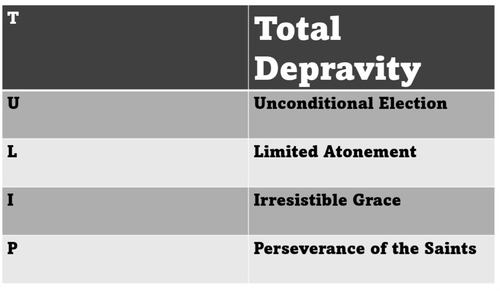Calvinism’s TULIP: Why Affirm Total Depravity?
Why Affirm Total Depravity? Welcome to the first post in our series on TULIP, the five points of Calvinism that form the backbone of Reformed theology. In this series, we’re hoping to make a compelling, biblical case for each of these five doctrines that are often considered difficult yet, are profoundly important. The acronym TULIP stands for:
- T: Total Depravity
- U: Unconditional Election
- L: Limited Atonement
- I: Irresistible Grace
- P: Perseverance of the Saints
Today, we’re focusing on the ‘T’ in TULIP: Total Depravity. Why must we affirm this doctrine? And why is it necessary to grapple with these challenging concepts in our times?
Let’s delve into Scripture to understand the importance and implications of Total Depravity, setting the stage for our exploration of God’s sovereign work in salvation throughout this TULIP series.
Understanding Total Depravity
Total Depravity asserts sin has affected every part of man’s being—our mind, will, emotions, and body. It doesn’t mean that all of us are as evil as we could be, but rather that sin has corrupted every aspect of our nature. This doctrine is crucial for several reasons:
- It Aligns with Scripture’s Teaching on Human Nature: The Bible consistently portrays human nature as fundamentally corrupted by sin, to the point that we’re spiritually dead. This truth is vividly illustrated in Ezekiel’s vision of the valley of dry bones (Ezekiel 37:1-14). The prophet sees a valley full of dry bones, representing humanity’s spiritual condition. These bones are not just sick or weak—they’re completely dead, incapable of life or movement on their own.
This powerful imagery depicts our spiritual condition apart from God’s intervention. We’re not merely injured or ill; we’re spiritually dead, utterly incapable of choosing God or responding to Him unless the Holy Spirit first regenerates us. As Ezekiel prophesies to the bones and they come to life, we see a striking picture of God’s plan of salvation for humanity through His Son, Jesus Christ.
This theme of spiritual death and divine regeneration is echoed throughout Scripture: sample these: Jeremiah 17:9, Romans 3:23,Romans 3:10-11, Ephesians 2:1. These passages paint a clear picture of humanity’s sinful condition, affecting our thoughts, desires, and actions. Like the dry bones in Ezekiel’s vision, we’re spiritually lifeless until God breathes new life into us through His Spirit. This understanding of Total Depravity underscores our complete dependence on God’s grace for salvation and aligns perfectly with the biblical narrative of redemption.
- It Magnifies God’s Grace:When we understand the depth of our depravity, we begin to grasp the magnitude of God’s grace. Paul reminds us of this truth in Ephesians 2:1, 4-5. Recognising our total inability to save ourselves magnifies the glory of God’s unmerited favour towards us.
- It Humbles Us: The doctrine of Total Depravity strikes at the root of human pride. Paul reminds us we bring nothing to the table in our salvation (Ephesians 2:8-9). This truth fosters humility and gratitude in the believer’s heart.
- It Emphasises Our Need for Divine Intervention: Total Depravity underscores our absolute dependence on God for salvation. Jesus Himself said: “No one can come to me unless the Father who sent me draws him” (John 6:44). This doctrine reminds us salvation is entirely a work of God, from beginning to end.
- It Provides a Biblical Framework for Understanding the World: Understanding Total Depravity helps us make sense of the evil and suffering we see in the world. It explains why, despite human progress, we still face moral failures and societal problems. Remember Jesus’ words in Mark 7:21-22?
Conclusion: Why Affirm Total Depravity? Affirming the doctrine of Total Depravity is not about wallowing in negativity, but about embracing the full truth of Scripture. It leads us to a deeper appreciation of God’s grace, a more profound humility, and a greater reliance on His power for transformation. As we grasp this doctrine, may we echo the words of the psalmist: “Create in me a clean heart, O God, and renew a right spirit within me.” (Psalm 51:10, ESV)
In affirming Total Depravity, we acknowledge our desperate need for God’s redemptive work in Christ, and we magnify the glory of His saving grace.
Why Affirm Total Depravity? Related FAQs
- What does the doctrine of Total Depravity mean? Total Depravity teaches that sin has affected every part of human nature—our minds, wills, emotions, and bodies. This does not mean all are as evil as they could be, but rather that sin has corrupted every aspect of our being, making us incapable of seeking God or doing good apart from His grace.
- Does Total Depravity mean people are incapable of doing good? No, Total Depravity does not mean people cannot perform acts that are morally good or socially beneficial. Rather, it means even our good deeds are tainted by sin and are not sufficient to earn salvation or please God without His grace.
- How does Total Depravity relate to free will? Total Depravity asserts that while we have free will, our will is bound by our sinful nature. This means that apart from God’s grace, we will not and cannot choose God or do what is pleasing to Him because our nature is inclined toward sin.
- Is Total Depravity the same as being totally evil? No, Total Depravity does not imply we are totally evil. Rather, it means sin affects all parts of our nature, preventing us from coming to God on our own and affecting our ability to perfectly follow God’s will.
- Why is the doctrine of Total Depravity important? Total Depravity is important because it highlights the necessity of God’s grace for salvation. It shows we cannot save ourselves and must rely entirely on God’s initiative and mercy to be brought to spiritual life.
- How does Total Depravity affect our understanding of salvation? Total Depravity underscores the idea that salvation is entirely a work of God. Since we’re spiritually dead in our sins, it takes God’s sovereign grace to regenerate and bring us to faith in Jesus Christ.
Why Affirm Total Depravity? Related Posts
Editor's Pick
SUPPORT US:
Feel the Holy Spirit's gentle nudge to partner with us?
Donate Online:
Account Name: TRUTHS TO DIE FOR FOUNDATION
Account Number: 10243565459
Bank IFSC: IDFB0043391
Bank Name: IDFC FIRST BANK






